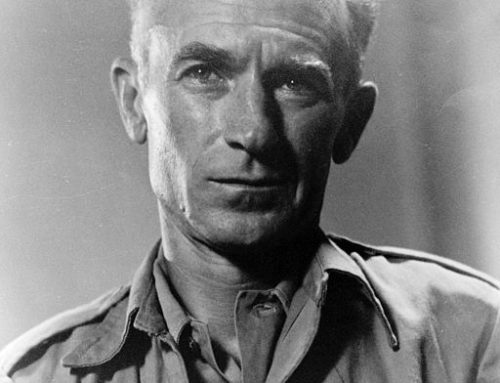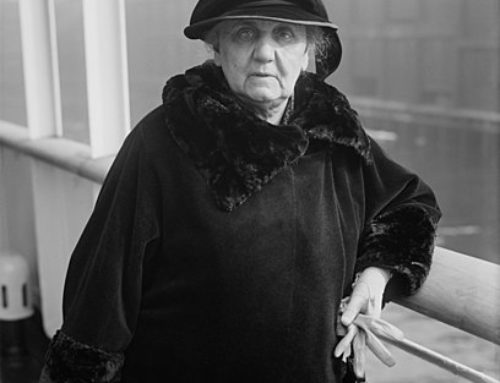Ian Fleming, the author of the James Bond series, said that “James Bond is a highly romanticized version of a true spy. The real thing is… William Stephenson. Ian Fleming worked for Stephenson during World War II, and this up-close relationship led to his lifelong affection and admiration for Stephenson. While there will always be some dispute over the exact nature and extent of his wartime efforts, there is no doubt that his contributions were many and extraordinary.
Sir William Stephenson, who was born in Canada, developed very close personal relationships with both Franklin Roosevelt and Winston Churchill, serving both men in developing the secret services both in the United States and in Great Britain. William Stephenson’s official title was British Passport Control Officer. His unofficial mission was to create a secret British intelligence network throughout the western hemisphere, and to operate covertly and very broadly on behalf of the British government and the Allies in aid of winning the war. Stephenson became Churchill’s personal representative to Franklin Delano Roosevelt.
Stephenson suggested to Roosevelt that he put Stephenson’s good friend, William J. ‘Wild Bill’ Donovan in charge of all U.S. intelligence services. Donovan founded the U.S. wartime Office of Strategic Services (OSS) which eventually became the Central Intelligence Agency (CIA).
Stephenson played several significant roles in helping Great Britain. He was particularly effective from the late 1930’s until the United States entered World War II in December 1941.
Let me elaborate. Under Churchill’s predecessor, Great Britain bent over backwards to not only accommodate the Nazis, but also to understate the extent of German rearmament. Stephenson fed accurate information to Churchill and his allies in Parliament about the exact status of both German military capability as well as the impotence of the British rearmament efforts. Thus, detractors of Chamberlain were well informed of the lack of honesty of Chamberlain’s government. That is, Chamberlain misrepresented his appeasement policies toward Germany and misrepresented the growing military gap between Great Britain and Germany. Knowing the facts helped Chamberlain’s opponents force Chamberlain out of office in May 1940, after repeated British failures to stop German capture of Norway, France, Belgium, Poland, and the Netherlands. The final straw was Chamberlain’s claim that “Hitler missed the bus” on Norway, when in fact the Nazis easily conquered that country.
When Churchill actually assumed the role of Prime Minister, Great Britain was in terrible shape, being the only major combatant in Europe either not allied with Germany or conquered by Germany. That is, the Soviet Union in May 1939 had signed a non-aggression pact with the Germans. The Soviet Union from May 1939 until June 1941 when they suffered a surprise attack, actively aided the Germans, providing significant raw materials and food to Germany. Moreover, the Soviet Union spent considerable effort cultivating their left-wing supporters to undermine British military efforts to hold out against Germany. Left wing labor leaders in both Britain and the United States took a strong pacifist stand. These pacifist American labor leaders worked with key Right-Wing capitalists in the United States to oppose any provision of military aid to the impotent British during the critical time period from May 1939 until December 1941. That is, America did not declare war on Germany and France until the surprise Japanese attack on Pearl Harbor.
Nevertheless, the British and Churchill were helped considerably by the efforts of the British Secret Service.
First of all, the British stole an Ultra Machine in Poland shortly after the German’s blitzkrieg against Poland. This machine allowed Britain to decode key German strategic decisions, and thus helped the undermanned British take military steps to counterbalance German initiatives.
Secondly, the British secret service helped organize a military coup against the pro-Nazi king of Yugoslavia. The enraged Hitler delayed his invasion of the Soviet Union six weeks in order to totally destroy Yugoslavia. The loss of these six weeks fatally undermined the German surprise attack on the Soviet Union, because the terrible Russian winter helped stall the German advances in the fall of 1941. Stated differently, the Russian winter was a major roadblock to the German army advance toward Moscow and Leningrad in 1941.
Thirdly, Stephenson directly influenced U.S. media (including the writing of American newspaper columnists Walter Winchell and Drew Pearson) and other media in the hemisphere towards pro-British and anti-Axis viewpoints. One the United States had entered the war; BSC went on to train U.S. propagandists from the American Office of War Information in Canada from 1941-1944.
Fourthly, BSC undermined Nazi efforts in Brazil, Argentina, Chile, Paraguay, Mexico, and Central America. Specifically, the BSC planted fraudulent documents that turned the Brazilian dictator Vargos strongly against the Nazis. Use of Brazilian seaports was most helpful to the Allies during World War II. Moreover, convincing Latin American countries not to trade with Germany undermined the Nazis because of their dependence on key food items and minerals from Latin America.
Fifth, the BSC uncovered pro-Nazi business plans by such American companies as IBM and Standard Oil of New Jersey. A combination of unfavorable publicity and strong-arming by the FDR White House cut back considerably these pro-German business activities.
Sixth, Stephenson helped convince Franklin Roosevelt that Churchill and the British people were firmly resolved to fight the Germans. Thus, Roosevelt against the advice of key military personnel, politicians, and state department personnel “secretly” provided significant military aid to Great Britain. That is, key officials like Joseph Kennedy, our Ambassador to the Court of St. James, were pro-Nazi sympathizers who dismissed Churchill as erratic and warned Roosevelt that American military aid could easily end up in German hands if Britain sought an armistice. Stephenson undercut Kennedy badly when he uncovered a Nazi spy, Tyler Kent, working for Kennedy in the American Embassy in London. A badly shaken Kennedy, fearful that he would be implicated in aiding this treachery had to sharply reduce his criticism of American aid to Great Britain.
Seventh, Stephenson and Donovan formed a tremendous alliance in sharing sensitive secret information. This cooperation between the secret services of different countries was unique and helped both allies immeasurably in the war against the Axis powers. Moreover, Stephenson through guile cultivated an embittered J. Edgar Hoover, who resented his loss of monopoly over intelligence gathering. That is, Hoover, always anxious to preserve the domain of the Federal Bureau of Investigation resented 1) Donovan’s OSS and 2) the widespread secret intelligence activity of the British within the United States. Fortunately, Stephenson had the tact to assuage the Prima Donna Hoover, allowing the BSC to operate covertly in the United States. Several key pro-Nazi American sympathizers met “unfortunate” and “premature” deaths through the intervention of the BSC. “Gone to Canada” meant a terminal destination, not a temporary respite.



